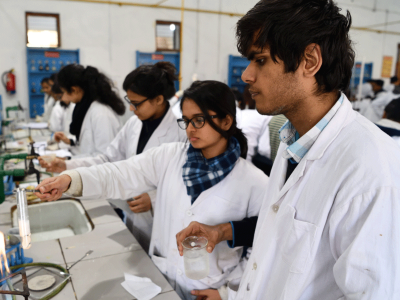
A PhD student works in a clean room at the University of Tokyo.Credit: Yuichi Yamazaki/AFP via Getty
In response to a decline in the number of PhD holders in Japan, the Japanese government has announced plans to not only stop the trend but reverse it, by tripling the number by 2040.
Japan is the only major economy that has recorded a dip in PhD numbers since 2000. In 2022, there were 14,382 new PhD admissions across the country — down 21% from a high of 18,232 in 2003.
As a proportion of the population, there are now fewer PhD holders in Japan than in many other leading research countries. According to Japan’s National Institute of Science and Technology Policy (NISTEP), in 2020, the country had 123 PhD graduates per million people, well below the rate of 315 per million in Germany and 313 per million in the United Kingdom for that year, and 285 per million in the United States in 2019.
A survey published by NISTEP in 2021 revealed that many doctoral students in Japan feel demoralized because of financial uncertainty, career insecurity and a lack of career progression.
To address the problem, Japan’s Ministry of Education, Culture, Sports, Science and Technology (MEXT) announced a three-pillared plan in March, with a focus on boosting career opportunities as well as institutional support and outreach for PhD students. The government is hoping to promote a cultural shift that raises the status of PhD holders in Japanese society.
“We want to create an environment that increases the number of people aiming for doctoral degrees, produces many excellent candidates, and realizes a fruitful life for each candidate and the sustainable development of society as a whole,” Mitsunari Yoshida, director of the Policy Division in MEXT’s Higher Education Bureau, told Nature Index.
Career choices
The first pillar of the initiative focuses on diversifying career choices, to ensure that doctoral candidates have a more active role in research outside academia, such as in local and central government, start-up companies and other private-sector groups.
2024 Research Leaders
This focus on industry and government roles aims to address a long-standing cultural issue in Japan, namely that having a PhD might actually limit someone’s chances of being hired.
“The greatest obstacle is the perception that once one gets a PhD in a subject, one is regarded as an expert in that particular field,” says Ken Mogi, a researcher in neuroscience at Sony Computer Science Laboratories in Tokyo, and a visiting academic at the University of Tokyo. “With that image comes the assumption that a person with a PhD is inflexible in work in the real world. For that reason, Japanese companies are typically not forthcoming in employing people with PhDs, discouraging students to consider a career with a PhD.”
MEXT plans to promote long-term, paid internships for PhD students in the private sector, as part of a broader effort to entrench internships in Japanese society.
Symbolic of this is Cooperative Education Through Research Internships, a programme introduced in 2021 with the support of 45 universities and 45 companies, including major Japanese brands. The paid internships run for at least two months, are eligible for academic credit, and aim to support doctoral researchers by matching them to companies and diversifying their career options. The ministry wants to increase the number of PhD candidates in these internships to 5,000 by 2030, up from 3,000 as of May this year.
Boosting support
As its second pillar, MEXT wants to raise the quality of graduate schools by providing extra funding and tracking their progress.
MEXT will part-fund PhD students’ living and research expenses through the Support for Pioneering Research Initiated by the Next Generation (SPRING) scheme, which is run by the Japan Science and Technology Agency to support outstanding doctoral students; and the Japan Society for the Promotion of Science’s Research Fellowship for Young Scientists programme, which supports doctoral students to pursue innovative research of their own choosing.
“Financial issues are significant in Japan, and many PhD students are struggling,” says Tomokazu Iwabuchi, a PhD student in urban planning at Kyushu University in Fukuoka.
After years of taking on part-time jobs during his master’s programme, Iwabuchi says he can now spend more time focusing on PhD research because he was chosen for the university’s Future-Creation course, which is part of the SPRING programme. Doctoral students on the programme receive ¥200,000 (US$1,360) per month to cover living expenses and language training, up to ¥850,000 yen per year in research expenses, and a 50% reduction in tuition fees.
In 2023, Iwabuchi started his own consulting business rooted in his research on urban planning and geographic information system (GIS) data. “I’m really happy to hear that the government is putting more resources into supporting PhD students,” he says. “I hope they will have more career options in the near future.”
Strengthening motivation
The third pillar is about boosting student motivation by supporting more outreach programmes. One example is the Future Doctoral Festival, an annual gathering in Tokyo at which doctoral students give presentations and take part in panel discussions related to their research. The goal of initiatives such as this is to showcase the appeal of pursuing a PhD, not just to students, but also to leading figures in the public and private sectors.
Ranny Herdiantoputri, a doctoral student in oral pathology at the Tokyo Medical and Dental University welcomes this outreach, but says more attention must be given to the mental health of prospective PhD students, especially those from overseas who might struggle with the Japanese language and feelings of isolation.
“Students can suffer from imposter syndrome and anxiety, and wonder, ‘Am I really good enough for this?’,” says Herdiantoputri. “Without proper support, outreach gatherings can make it worse.” She adds that teaching jobs at Japan’s public universities are almost impossible to get, and she plans to return to her home country, Indonesia, after her degree.
Will it work?
Koichi Sumikura, who studies science and technology policy at the National Graduate Institute for Policy Studies in Tokyo, thinks that a change in mindset among those in industry is a must. “A majority of industry managers in Japan consider that the expertise and the area of interest of PhD holders are too narrow and do not fit their business,” he says. “However, PhD holders tend to be trained for acquiring a wider field of view.”
Sumikura emphasizes the importance of PhD programmes teaching skills that are relevant to industry. “PhD holders themselves should be trained not only in a specific academic expertise, but also general scientific knowledge, communication skills and business and social literacy,” says Sumikura.
Nobuko Kobayashi, who works for EY-Parthenon, a consultancy based in Boston, Massachusetts, and who writes about innovation and human resources in the Japanese media, says she hopes that Japan will consider and support entrepreneurship opportunities for its PhD holders.
“It’s important that universities strengthen education and opportunities around entrepreneurship, so students can bridge their research with real-world applications,” says Kobayashi. One encouraging factor is the increase in start-ups in Japan. In particular, she says, the number of start-ups spun off from Japanese universities has increased every year, and these firms “also hire significantly more PhD graduates compared to other Japanese companies”.
It is to soon to tell whether the measures Japan is now undertaking can motivate its doctoral students, change hiring practices and overhaul its research culture. But Sumikura agrees that the effort is worthwhile. “It is not easy to achieve that goal, but it is worth trying,” Sumikura says.



